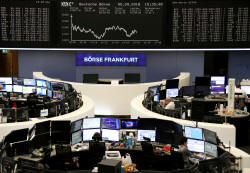Stock markets on edge over Delta virus variant, Fed policy
 Send a link to a friend
Send a link to a friend
 [June 29, 2021] By
Tom Arnold and Paulina Duran [June 29, 2021] By
Tom Arnold and Paulina Duran
LONDON/SYDNEY (Reuters) - Global shares
inched back from record highs on Tuesday on concerns about new
coronavirus outbreaks in Asia undercutting an economic recovery, while
investors remained on edge over the United States' exit from
accommodative policy.
European stocks, as measured by the pan-European STOXX 600 index, were
up 0.4%, helped by a jump in industrial, financial and mining stocks,
sectors set to benefit from economic improvements.
Optimism around a steady recovery has put the European benchmark on
course for its fifth straight month of gains.
In contrast, MSCI's broadest index of Asia-Pacific shares outside Japan
was 0.5% lower as recent positive momentum stalled as some countries
re-imposed lockdowns to contain the spread of the Delta variant of the
virus.
Japan's Nikkei fell 0.8%, while in Australia the ASX/200 index closed
down 0.1% as increasing COVID-19 curbs across the country dented
sentiment. The South Korean market closed 0.5% lower.

Chinese stocks lost 0.92% as investors booked profits after a rally on
the back of the country's strong rebound from the impact of the COVID-19
pandemic.
U.S. stock futures, the S&P 500 e-minis, were flat, while MSCI's all
country world index, which tracks shares across 50 countries, was 0.1%
weaker, off record highs scaled the day before.
Fears over the spread of the highly infectious Delta variant are denting
sentiment at a time markets are on edge after the Fed shocked traders
with a hawkish tilt earlier this month.
Indonesia is grappling with record-high cases, while Malaysia is set to
extend a lockdown and Thailand has announced new restrictions.
"The outlook for policy in general and the U.S. specifically, both
fiscal and monetary, is the more relevant factor in the market's mind
right now rather than the spread of the Delta variant," said James Athey,
investment director at Aberdeen Standard Investments. "That may well
prove to be naive or complacent."
In Europe, investors were looking to the release of German consumer
price data on Tuesday for clues about what they may mean for continued
central bank stimulus.
A Reuters poll suggests the figure for June, due out at 1200 GMT, would
be at 2.3%, overshooting the European Central Bank's target for the
bloc.
In the U.S., a closely-watched jobs report for June will be released on
Friday. It could sway the Fed's policy outlook and bring forward
expectations for interest rate increases.
"Inflation is already much higher than the Fed was anticipating, so it
is really the pace of improvement in the labour market that stands head
and shoulders above every other indicator in terms of when the Fed will
feel comfortable signalling the start of tapering," said Ray Attrill,
Head of FX Strategy at National Australia Bank in Sydney.
[to top of second column] |

The German share price index DAX graph is pictured at the stock
exchange in Frankfurt, Germany, September 5, 2018.
REUTERS/Staff/File Photo

News of a possible bipartisan U.S. infrastructure spending agreement over the
weekend helped boost risk appetite on Monday.
On Wall Street, the Nasdaq and S&P 500 had gained 0.98% and 0.23%, respectively,
on Monday to hit all-time highs, fuelled by tech stocks as investors bet on a
robust earnings season.
Yields for benchmark 10-year U.S. Treasuries edged higher, but below levels of
recent days, at 1.4951%. Last week, it notched its largest weekly gain since
March.
Germany's 10-year bond yield was flat at -0.187%, within sight of a recent
one-month high.
In currency markets, the U.S. dollar pushed towards three-month highs versus
major counterparts. Against a basket of its rivals, the greenback rose 0.14% to
92.003. But many investors stayed on the sidelines ahead of Friday's jobs
report.
Investors are also looking at U.S. consumer confidence data later on Tuesday as
well as the Institute for Supply Management's manufacturing index on Thursday
for clues as to where interest rates are headed.
Both the dollar and yen have benefited from some safe-haven demand, driven by
concerns over the spread of the highly contagious Delta variant first identified
in India.
The euro declined 0.1% to $1.1911, edging back toward the 2-1/2-month low of
$1.8470 touched on June 18.
The British pound slipped back toward a two-month low, weakening 0.2% to
$1.3861.
Concerns over renewed COVID-19 lockdowns across parts of Australia hampered the
country's dollar, which fell 0.3% to $0.75580.

Angst over the virus spread also hit oil prices, which slipped for a second day
as investors worried about slower fuel demand growth.
Brent crude was down 0.2% at $74.54 a barrel, while U.S. light crude slipped
0.1% to $72.82 per barrel.
Spot gold was 0.6% down at $1,768.10 per ounce.
(Reporting by Tom Arnold in London and Paulina Duran in Sydney; Editing by Shri
Navaratnam and Emelia Sithole-Matarise)
[© 2021 Thomson Reuters. All rights
reserved.] Copyright 2021 Reuters. All rights reserved. This material may not be published,
broadcast, rewritten or redistributed.
Thompson Reuters is solely responsible for this content.
 |